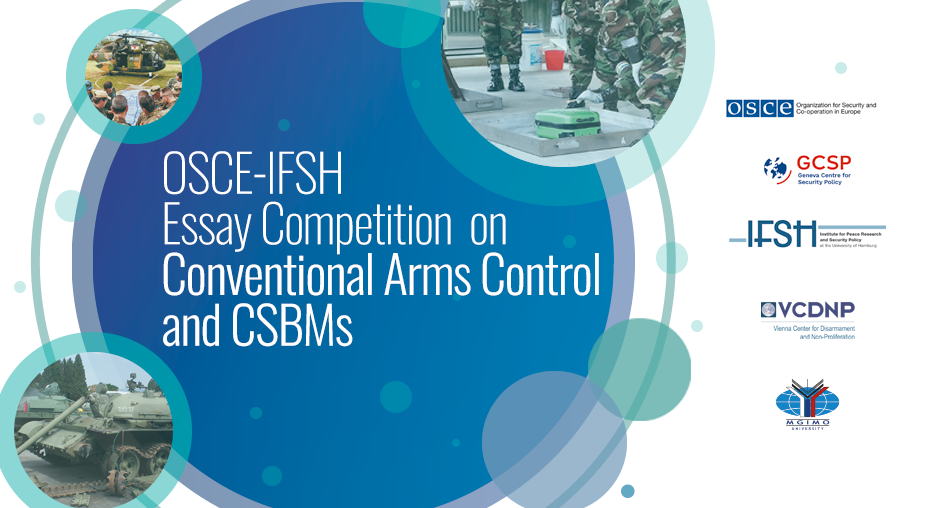Fresh perspectives on conventional arms control in Europe
The OSCE’s participating States have created the most advanced regime for conventional arms control, disarmament and confidence-and security-building measures (CSBMs) worldwide.
They are designed to encourage greater openness and transparency to increase military security and stability in the Euro-Atlantic and Eurasian areas, helping States to understand each other’s intentions in the military sphere.
In recent years, there have been discussions on how these frameworks could be better implemented and modernized to reduce risks and reflect better the current politico-military environment.
In March 2020, the OSCE and the Institute for Peace Research and Security Policy at the University of Hamburg, together with the Moscow State Institute for International Relations (MGIMO), the Geneva Centre for Security Policy and the Vienna Centre for Disarmament and Non-Proliferation, launched a competition, calling on students and young professionals to submit their ideas.
The entrants had to be nationals of OSCE participating States and Partners for Co-operation, no older than 35 years of age, and women were especially encouraged to apply.
There were 96 entries from participants in 36 OSCE participating States.
Let’s meet the three finalists and learn more about their winning submissions.
Benjamin Schaller
Benjamin Schaller (Germany, Arctic University of Norway in Tromsø) was selected by the jury as the overall winner of the competition. He said he first became interested in the work of the OSCE through an internship with the division for conventional arms control and CSBMs at the German Federal Foreign Office. Since then he has had a key interest in the OSCE and in arms control and CSBMs.
Schaller’s essay reflected upon the untapped potential of a stronger multilateral approach to verification in European arms control. He discussed the main benefits of a multilateral approach to verification, and identified lessons-learned from existing approaches to multilateral arms control verification under the authority of some international organizations. He presented and discussed a number of conceptual ideas for a stronger role of the OSCE in European arms control. In particular, his essay focused on the possibilities, benefits, and requirements for the OSCE to deploy fact-finding missions and conduct investigations on behalf of OSCE participating States in times of increased political tensions and distrust. His essay concluded with a number of concrete policy proposals and recommendations on how to strengthen the OSCE’s role in European arms control.
Schaller hopes to inspire and generate interest among young people in the topics of disarmament, arms control, and military confidence-building, areas which he feels are in urgent need of young voices and fresh ideas.
Naomi Egel
Naomi Egel (USA, Cornell University) came second in the competition. She learned about the OSCE through her research on multilateral weapons governance. In her opinion, the OSCE is a unique political grouping of countries that offers a distinctive approach to governing the production, possession, and use of different weapons. She found however, that scholars studying arms control, non-proliferation, and disarmament often overlook the role of the OSCE. Therefore, she began to examine the OSCE’s history in this area, as well as its unique organizational structure and political dynamics.
Egel’s essay focused on the rise of the importance of autonomous weapons systems (AWS) in military operations and how this could increase the risk of inadvertent escalation. Her essay brought innovative ideas forward on how the OSCE should develop confidence-building measures (CBMs) for AWS. Her essay highlighted that the OSCE has a strong history of creating CBMs for other types of weapons and is therefore uniquely positioned to develop CBMs for AWS. She wrote that by doing so, the OSCE would be contributing to reducing the risks AWS pose.
Anastasia Prokhorova
Anastasia Prokhorova (Russian Federation, Central European University) came third in the competition. Her interest in the OSCE started to take shape during her undergraduate studies at MGIMO-University. While doing her thesis research, she wondered why literature criticizing the OSCE predominantly focused on the Organization’s capacities to confront traditional threats.
Her essay highlighted the role the OSCE plays in reducing military risks in Europe and how its capacities are employed today. The essay explored ideas on why the OSCE is perceived to be underperforming in certain areas. To contrast that view, her essay highlighted the OSCE’s innovative approach to security elaborated within the OSCE framework, while engaging with the concepts of “soft security” and “Peace as Freedom”.
Prokhorova plans to pursue a career in academia. She looks forward to contributing to the field of European security and conventional arms control.
The three finalists were invited to a session of the OSCE Forum for Security Co-operation on 9 December, where representatives of the participating States learnt more about their thought-provoking ideas and innovative thinking. (See the press release here)
The jury praised the quality of the submissions received, remarking that the future for European security looks hopeful as we turn towards a new generation of young professionals for fresh thinking and perspectives on how to make our world safer against military threats and conflict.

